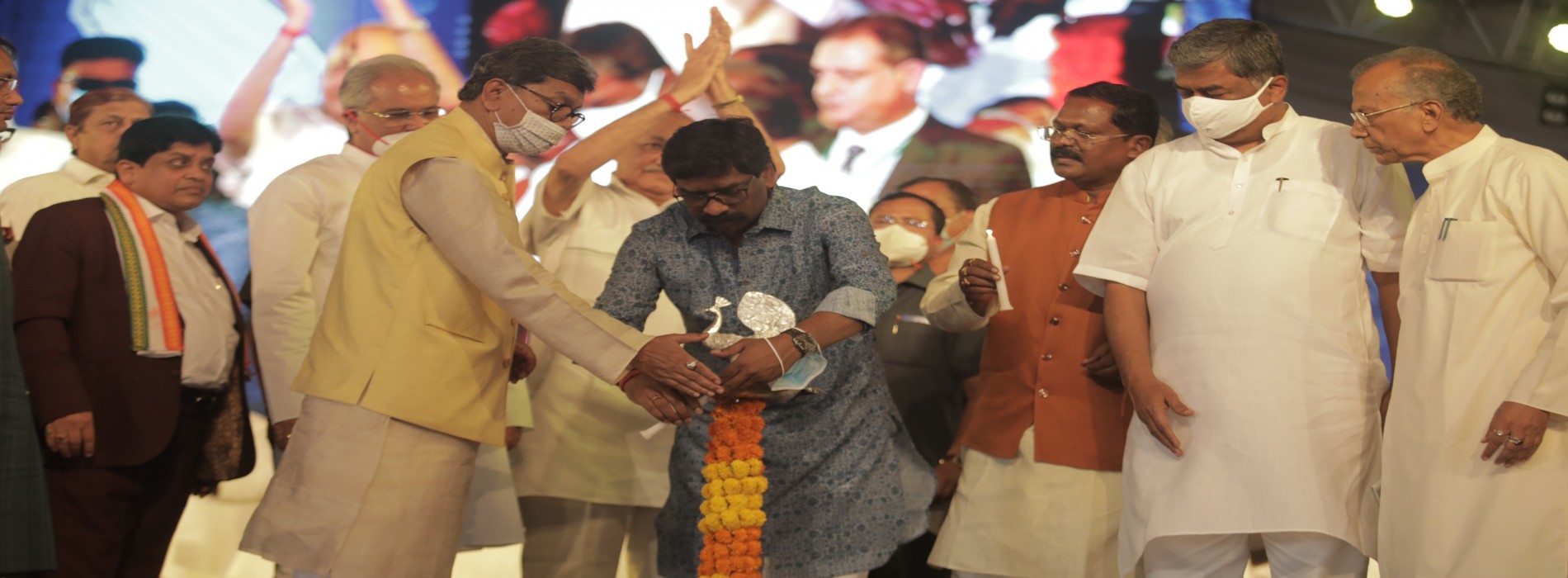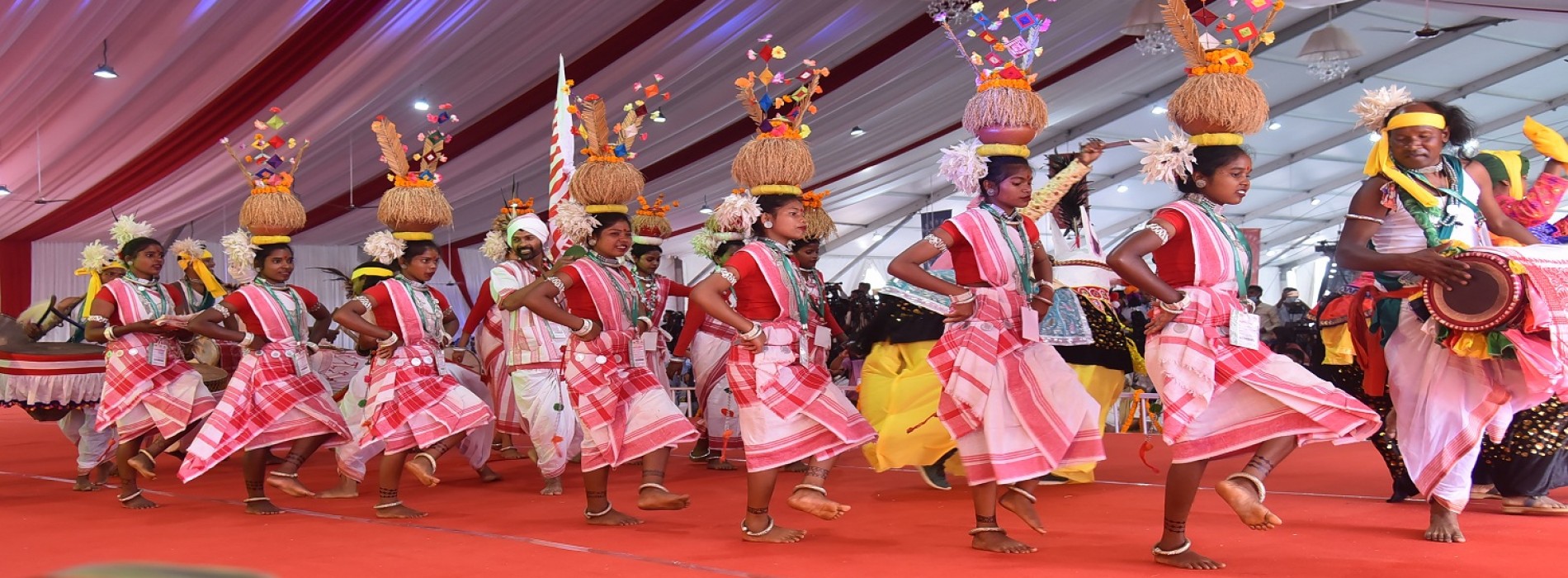National Tribal Dance Festival: Vibrant expression of tribal life
Words By Suman Bajpai
The whole scenario was welcoming. Music, songs, beats, excitement, energy and a life full of enthusiasm and cheerfulness all over the place. It seemed that everyone was in a mood to dance as the audience and the general public, moving their steps even walking. Or when they see dancers dancing on the ground, they also started dancing along with them. Dressed in festive finery and with exhilaration writ large on their faces, hundreds of people from tribal communities from across the country witnessed exuberant performances in the National Tribal Dance Festival.
One of the biggest tribal festivals of India, the National Tribal Dance Festival was held at Science College ground in Raipur, the capital of Chhattisgarh from 28th October to 30th October. It saw the participation of Tribal Dance Groups from 27 states and six union territories of India along with international participation from countries like Uganda, Uzbekistan, Nigeria, Kingdom of Eswatini, Sri Lanka, Palestine and Mali who came together on one platform to celebrate the tribal heritage and culture. Around 1,000 artists, including 63 foreign artists, had performed. Over 1,500 members representing the diverse tribal ethnic communities took part in the event.
Indeed, it was a beautiful unification of different cultures.
The first edition of the dance festival was held in 2019, where it saw massive success with participation from 25 states of India and 6 countries, and with a footfall of around 1 lakh people. This year, besides the dance performances, the festival was also used as a platform to address the economic development initiatives of tribal communities.
Chance to experience Chhattisgarh
Jharkhand CM Hemant Soren inaugurated the event which was presided over by his Chhattisgarh counterpart Bhupesh Baghel. Soren praised Chhattisgarh for its ‘innovative initiative on preserving, safeguarding and promoting the culture of the tribals.’ “This is not just the dance festival but also recognising the tribals with high regard,” he said.
On the second day of the programme, Punjab Chief Minister S. Charanjeet Singh Channi was the chief guest.
On this occasion, culture minister Amarjeet Bhagat said, “our objective is to preserve the tribal heritage by developing initiatives that promote the tangible and intangible parts of the tribal culture. National Tribal Dance Festival is a unique celebration that will not only showcase the various tribal dance forms but also help in conserving and promoting our tribal traditions and values.”
Chhattisgarh Chief Minister Bhupesh Baghel who conceived the idea of organising this festival, said, “The 2nd edition of National Tribal Dance Festival has given people a glimpse of the vibrant state Chhattisgarh. We are proud of our tribal community and this festival is a celebration of their rich culture and heritage. Artists and artisans from various tribal communities came together on one platform to showcase their talent and work to the world. In Tribal Conclave we delved deeper into discussions of exploring more avenues that will not only give boost to state tourism but also help in socio- economic development of the tribal community. Chhattisgarh is now ready to welcome the tourists with open arms into this land full of surprises.”
Mr Anbalagan P, Secretary Tourism and Culture, Government of Chhattisgarh; said, “government can help as a facilitator in promoting tourism and this can be achieved with the help of experts from fields hospitality and tourism. The tribals do take a lot of pride in their culture and heritage and have a strong belief in nature and the natural way of life. The focus of the government is to develop agro-tourism and eco-tourism and festivals are also a great way to promote the tribal culture of the state. The involvement of locals is important for rural tourism and the government is focusing on initiatives that help promote rural tourism. Moderator Yasmin Kidwai touched upon rest houses in Chhattisgarh which are its hidden treasures and how they can be a major attraction for tourists.
Besides the dance performances, the festival had provided a wholesome experience of Chhattisgarh to its visitors. From the local cuisine to tribal-inspired fashion exhibits and local handicrafts, this dance festival had given the people the true experience of being in Chhattisgarh.
Performances around two themes
In the three-day event, national teams competed for the top three positions with prizes worth Rs 5 lakh, Rs 3 lakh and Rs 2 lakh, respectively. The competition was in two categories — a wedding dance (Vivah Sanskar) and a traditional dance themed around harvesting or agriculture. Team Jharkhand won in both categories, winning cash prizes of Rs 10 lakh. Team Odisha was the runner-up in both categories, while Team Assam won the third slot in the wedding dance category and Team Chhattisgarh won the third position in the traditional dance category.
From Nigeria’s Efik people’s ”Ekombi” dance to Palestinian girls’ ”Dabke” performance and tribals of Chhattisgarh’s Durg and Surguja districts matching steps in ”Saila” and ”Karma” dances, the festival had a lot to offer. Folk dances from states like Telangana were amazing. Koya, a dance form in which men wear horned crowns and beat on drums, while women wear brass crowns and strike the ground with sticks, and Tripura’s Hojagiri dance- in which women dance while balancing earthen lamps on their heads, mesmerized the audience. Telangana’s Ghusadi dance, the traditional dance of Tilangana’s Ghond community, is performed over the period of 10 days prior to Diwali. The group has 30 members who perform the dance to make their “Devtas” happy, the prominent of them all being atma sur devta, a Prakriti devta. They were preparing the dance for this event for more than four months, so lots of effort go into each dance.
Taking place on the eve of the UN climate summit in Glasgow, the festival saw representatives of tribal communities from India and abroad put up a united front: from Bastar to Birbhum and Uganda to Uzbekistan, tribal communities expressed a desire to return to traditional cultures that place respect for nature at the centre of daily life.
“We are experiencing climate change because of the erosion of our cultures. We must preserve and popularise traditional cultures around the world to protect our planet,” said Ugandan National Cultural Centre’s Musiitwa Robert who was accompanying a seven-member dance troupe from the East African nation he adds. He feels that there is a direct link between climate change and cultural degradation.
Lots to know about tribal life
The Festival was also an opportunity for the people to get to know about the costumes, jewellery, crafts, designs, and food of the tribals. It was an occasion for the tribal communities to share their experiences in various fields, including arts, music, film, health, tourism and food. They shared their thoughts about the developments in their community and plans on this large platform, which was a big world of one of its kind in some way. The tribal community showcased their work and people got the chance to get detailed information about their arts and crafts. Costumes, jewellery, designs inspired by tribal culture and handicrafts were on display. Whether it is Dokri art, Metalwork, Bamboo work, Tumba art or clay work. The weaving of sari or making of pottery, or tribal jewellery, there was a lot to see and understand. People had a chance to get familiar with the local and tribal food and drink of Chhattisgarh.
The conclave had interesting sessions
Different sessions related with the issues of tribes and tribal life were also organized. The first day of the conclave delved into topics from responsible tourism to tribal art and craft, and the market to popularizing local cuisine and wellness.
In the panel discussion `Responsible Tourism in the Post-Covid World`, Yashwant Kumar, Managing Director, Chhattisgarh Tourism Board; Jeet Singh Arya, Founder of travel start-up `Unexplored Bastar`; Sunny and Deeptie Raj, owners of the eco-resort Bhoramdeo Jungle Retreat and Anjuna Dhir, Executive Director, The Responsible Tourism Society of India, moderated by Yasmin Kidwai, Festival Curator and Event Director highlighted on the need to create valuable experiences for domestic tourists and the importance of making tourism sustainable by involving local communities.
Tribal art and crafts and the market talked about the need for revival and preservation of traditional crafts. Panellists Ayush Shrivastav and Gaurav Kushwaha, Founders of Lokabazar.in Bastar`s first handicraft e-commerce start-up; Rashmi Dhanwani, Founder of Art X Company; Chaitsi Ahuja, Founder of Brown Living and Asif Khan, Founder of Nature Escape, discussed how digital platforms can be combined with traditional crafts to create opportunities for artisans to explore new markets.
Food is an important way of retaining a cultural identity. In the panel `Popularizing Local Cuisine` Manish Mehrotra, the Celebrity Chef of the renowned restaurant Indian Accent; Anoothi Vishal, Culinary Historian, Author, and Curator; Prateek Sadhu, Executive Chef and Co-owner of Mumbai-based restaurant Masque and Raziya Shaikh, Director of Bastar Foods talked about the ways in which local cuisine can be highlighted to enhance the tourist experience. This engaging discussion delved into the avenues that can be created to popularize the cuisine of Chhattisgarh and encourage food entrepreneurs.
No doubt that this festival will enhance mutual cooperation between tribal communities and organisations, and explore the possibilities of promoting rural development, environment, and tourism. It has such a wide spectrum that one wish that it never ended.
You might also like
Cruise terminal in Chennai to be ready in a month
Chennai’s status as a holiday destination for cruise ships is set to get a boost in two years. To lure tourist operators, the Union shipping ministry has offered them special
From Monaco with Love…
Taste the Mediterranean art of living on wonderful excursions amidst spell-binding scenery where the heart beats a little faster! Discover tales of localities embracing the nostalgia of the region. Not
Canadians exempt from the “business” visa to enter Argentina
The Argentine government has exempted visas for Canadians entering the country for business reasons, temporarily, from 1 December 2016. The Argentine government has exempted visas for Canadians entering the country









